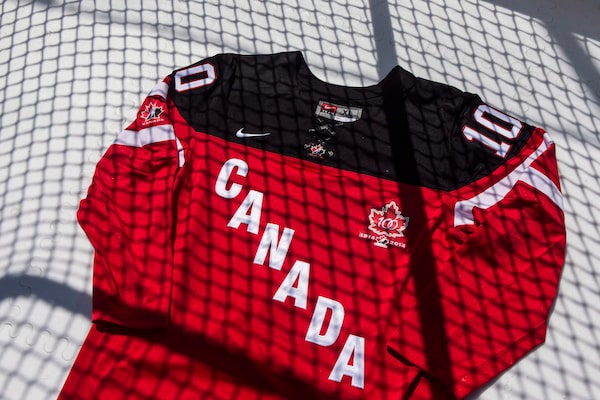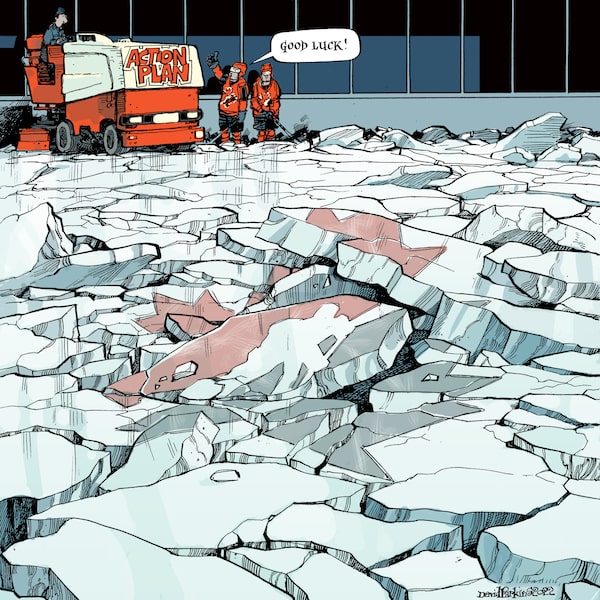Good morning,
E.M., the woman who filed a lawsuit against Hockey Canada over an alleged group sexual assault by some members of Canada’s world junior hockey team in 2018, says that she has felt “vulnerable and exposed” since news of her allegations became public two months ago. The news broke two days after Hockey Canada settled the case on May 24 and has since spiralled into a national scandal – something she says she never wanted to happen.
“This is something I never wanted to draw attention to,” she said in a brief interview with The Globe and Mail on Monday. “I simply wanted consequences for actions and some accountability.”
In the wake of the London Police Service recently reopening her complaint, E.M. met with detectives last week. And on Thursday, she sat for a private polygraph exam, the results of which were shared with The Globe. Her lawyer, Rob Talach, says it was important to E.M. to do the polygraph because of recent suggestions that she has not been totally honest in her account of the events.

A commemorative jersey is pictured at Hockey Canada's news conference in Toronto on Thursday, June 26, 2014 to launch their 100th anniversary celebration plans. THE CANADIAN PRESS/Chris YoungChris Young/The Canadian Press
This is the daily Morning Update newsletter. If you’re reading this on the web, or it was forwarded to you from someone else, you can sign up for Morning Update and more than 20 other Globe newsletters on our newsletter signup page.
Canada abandoned Ukrainian embassy employees despite their likelihood of being on Russian hit list
Before pulling Canadian diplomats out of Ukraine weeks ahead of the Russian invasion, Global Affairs Canada received intelligence confirming that Russia intended to wage war against its neighbour, and that Ukrainians who worked for the Canadian embassy were likely on lists of people Moscow intended to hunt down.
Despite the apparently dire situation, Ottawa told Canadian embassy leaders in Kyiv to withhold this information from those Ukrainian staff members and leave them behind.
These events were described to The Globe and Mail by three Canadian diplomats with direct knowledge of what happened, who say they are troubled by the way Canada left its Ukrainian employees at risk.
Killing of al-Qaida leader is long-sought ‘justice,’ Biden says
President Joe Biden announced yesterday that al-Qaeda leader Ayman al-Zawahri was killed in a U.S. drone strike in Kabul, an operation he said delivered justice and hopefully “one more measure of closure” to families of the victims of the Sept. 11, 2001, attacks on the United States.
The president said in an evening address from the White House that U.S. intelligence officials tracked al-Zawahri to a home in downtown Kabul where he was hiding out with his family. The president approved the operation last week and it was carried out Sunday.
Al-Zawahri and the better-known Osama bin Laden plotted the 9/11 attacks that brought many ordinary Americans their first knowledge of al-Qaeda. Bin Laden was killed in Pakistan on May 2, 2011, in operation carried out by U.S. Navy SEALs after a nearly decade-long hunt.
Aging Ukrainian refugees consider returning home after struggling to adapt
Millions of older Ukrainians have been driven from their homes because of the war. Ukraine has one of the oldest populations in Europe – about a quarter of Ukrainians are 60 or older, according to the charity HelpAge International, and that figure jumps to 30 per cent in the Donetsk and Luhansk regions, where some of the bloodiest fighting has taken place.
Now, after living in a foreign land for almost six months, a growing number of older refugees are struggling. Psychologists say they are grappling with trauma, the loss of their homes and the strain of trying to get by on a meagre Ukrainian pension.
Raisa Levayk, 65, is currently living in Poland with her two daughters and a grandson. She can’t speak Polish or find work, and could be at risk of losing her free housing in the fall. Many older refugees like Levayk are considering returning to Ukraine, to be with the family and country they had to leave behind.
Got a news tip that you’d like us to look into? E-mail us at tips@globeandmail.com Need to share documents securely? Reach out via SecureDrop
Also on our radar
Records of Canadian residential schools in Rome can help with identification of missing Indigenous children: A collection of records held by the Missionary Oblates of Mary Immaculate in Rome, including personnel files and hundreds of black-and-white photos pertaining to residential schools in Canada, offers “another piece of vital information” for the identification of missing Indigenous children, says the head of archives at the National Centre for Truth and Reconciliation.
White House decries China rhetoric over Nancy Pelosi Taiwan visit: U.S. House Speaker Nancy Pelosi has made no official announcements about visiting Taiwan on her Asian tour, but local media in Taiwan reported that she is expected to arrive on Tuesday night. If she visits, she will be the highest-ranking U.S. official to make the trip in more than 25 years.
Health Minister brushes off outrage over visa denials for AIDS conference in Montreal: Canada’s refusal of visas for hundreds of delegates from low-income countries, which sparked anger and allegations of racism from activists, was called a “collective tragedy” by Health Minister Jean-Yves Duclos yesterday.
German Chancellor defends Trudeau, saying Canada called Putin’s bluff by agreeing to send Russian turbines back: Canada circumvented its sanctions against Russia, drawing outrage from Ukraine, to sent back the first Nord Stream 1 turbine to Germany, but the turbine has not yet been delivered to Gazprom in Russia.
Polio found in New York wastewater as state assesses virus’ spread: Wastewater samples show that the virus, which has no cure, was present in Rockland County a month before health officials confirmed the first case.
Morning markets
Global stocks slipped and bond yields fell today, compounding fears of a global recession, on concern that a visit by U.S. House of Representatives Speaker Nancy Pelosi to Taiwan would further harm relations between China and the United States.
MSCI world equity index, which tracks shares in 47 countries, fell 0.4 per cent. Japan’s Nikkei slid 1.42 per cent, while Hong Kong’s Hang Seng lost more than 2 per cent.
FTSE 100, Britain’s blue-chip index, erased opening losses to edged 0.2 per cent higher in early trading, buoyed by strong results from oil major BP. Germany’s DAX dropped 0.6 per cent, while France’s CAC 40 slid 0.44 per cent.
What everyone’s talking about
Deny, deny, deny all we want, but COVID-19 is still a health threat
“We are in that cognitively dissonant time now when COVID-19 is still very much a medical threat, but has been deemed to be over, politically, and socially. As long as we continue to play down and deny the medical threat – and its effect on the health system, in particular – and embrace the ‘it’s over’ mantra, we will just be whistling past the graveyards.” – André Picard
Nurse practitioners could relieve Canada’s doctor shortage, but funding models are causing roadblocks
“An influx of more nurse practitioners is the shot in the arm our health care system desperately needs. But it will only happen if provincial ministries of health recognize that the rules concerning the funding of this important aspect of the health care model must change.” – Tracey Tremayne-Lloyd
Today’s editorial cartoon

David Parkins/The Globe and MailDavid Parkins/The Globe and Mail
Living better
A new ethos is helping make fitness more attainable, and less toxic
For the average person, “no pain, no gain” can seem like an unappealing fitness mantra. Rather than chasing after big, audacious fitness goals, goals that typically take up a ton of time and emotional energy, personal trainer Paul Landini likes to focus on achieving a very attainable yet equally challenging standard he calls “reasonably fit.” Read all about his nuanced approach to personal fitness routines.
Moment in time: August 2, 1992
Canadian rower Silken Laumann raises her arm in gesture as she leaves the winners area with her gold medal for the Barcelona Olympic women's single scull competition in Banyoles.RON POLING/The Canadian Press
Silken Laumann wins Olympic rowing bronze less than three months after major injury
When it comes to memorable Olympic stories, one of the most inspiring is behind Silken Laumann’s bronze medal in 1992. In mid-May, with only 10 weeks before the Olympics, Ontario rower Laumann was injured in a brutal accident with a German men’s team boat in a warm-up area in Essen, Germany. Laumann’s right leg shattered and she required five operations and three weeks in hospital to mend. “I saw the muscle hanging by my ankle and I could see the bone,” Laumann later told CBC. Despite being told she would never row again, Laumann was back in the water by late June, and arrived in Barcelona ready to compete while still needing a cane to walk. Laumann made it to the 2000m single sculls finals where she found herself in fourth place with only a few hundred metres left in the race. But in the final stretch, she overtook the U.S. to finish third. Laumann’s remarkable accomplishment saw her named as Canada’s flag bearer for the closing ceremony. Laumann would go on to document her experience 22 years later in her memoir, Unsinkable. It’s also the name of her charitable organization for mental-health support. Sometimes, it’s not only gold that’s worth celebrating. Ambika Sharma
Read today's horoscopes. Enjoy today's puzzles.
If you’d like to receive this newsletter by e-mail every weekday morning, go here to sign up. If you have any feedback, send us a note.